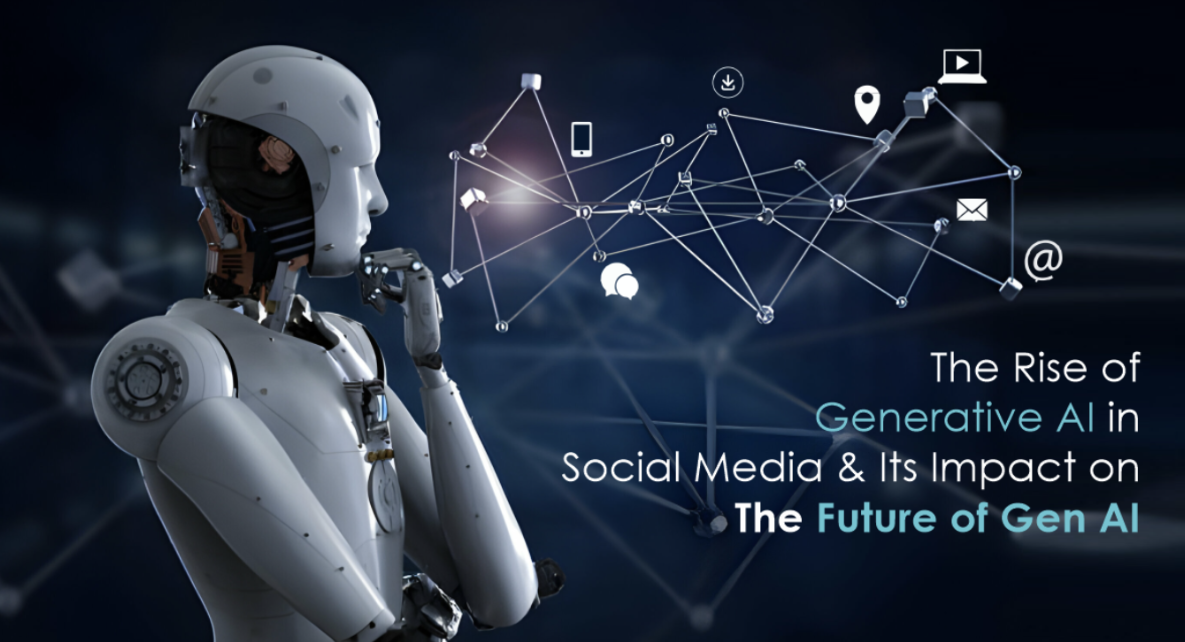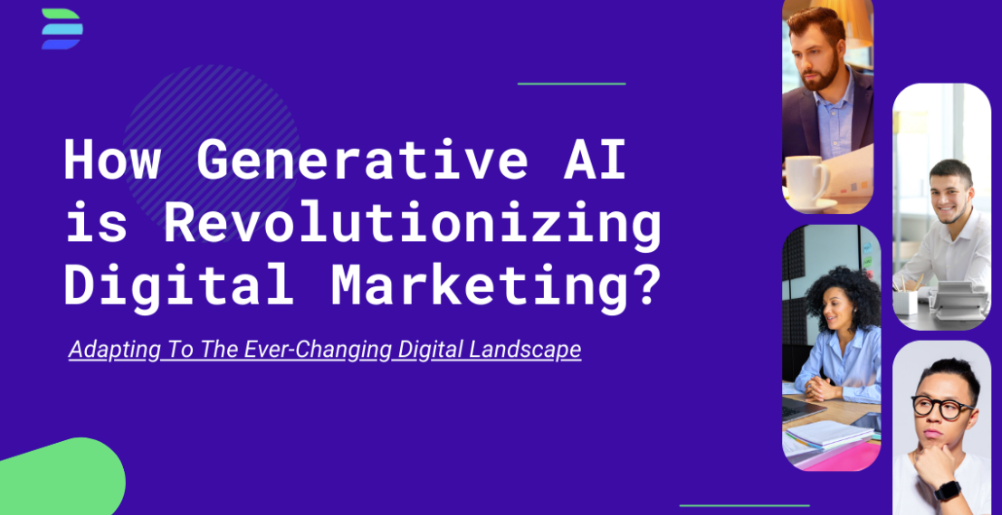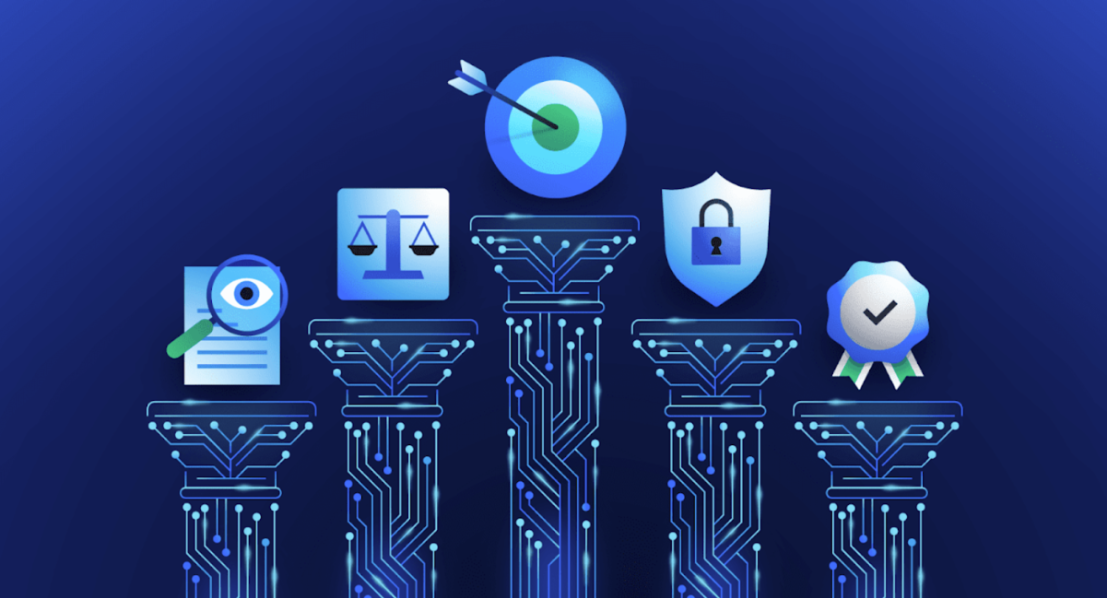As businesses strive to stand in the digital era, the significance of effective AI in marketing and engaging media has never been more profound.
With the rise of generative AI development, the landscape of digital media & marketing is undergoing a great transformation. It is promising
— Unparalleled creativity
— Efficiency
— Effectiveness
This technology innovation, fueled by neural networks and ML algorithms, possesses the remarkable ability to generate new content, images, and even entire experiences autonomously.
With its capacity to create personalized content at scale, anticipate consumer preferences, and streamline campaign strategies, generative AI can unlock unprecedented levels of creativity, efficiency, and impact.
Through this blog post, let’s learn about generative AI development and explore the future of digital media and marketing, where innovation knows no bounds and possibilities are limitless.
Generative AI Impact on Digital Media

Let’s first understand Generative Artificial Intelligence’s impact on digital media as discussed below:
— 1. Content Creation: Generative AI streamlines and improves content creation processes across various mediums, such as blog posts, videos, and graphics.
— Through advanced algorithms and vast data analysis, generative AI development automates the generation of high-quality, relevant content, saving time and resources.
— Enables exploration of new creative avenues by facilitating the generation of unique and engaging multimedia experiences tailored to specific audiences.
One such example is the collaboration between a leading news outlet & a generative AI platform to automate the creation of personalized news articles.
The AI system generates tailored news content tailored to each reader’s interests, increasing engagement and retention rates significantly by analyzing user data & preferences in real-time.
Similarly, in the case of video production, entertainment companies have adopted generative AI to streamline the creation of visual effects and animations using AI Image Tools, with images generated by AI, resulting in faster turnaround times and enhanced visual quality..
— 2. Personalization & User Engagement: Generative AI development plays a pivotal role in revolutionizing user engagement by enabling personalized content delivery tailored to the unique preferences and behaviors of individual users. With advancements in image to video AI, static images can seamlessly transform into dynamic videos, enhancing visual storytelling and engagement.
— Through sophisticated algorithms and data analysis, AI systems can analyze user data in real time to understand preferences, interests, and past interactions.
— This further allows for the creation of highly personalized content experiences.
Examples of platforms using AI for personalized content delivery:
— Streaming services like Netflix & Spotify leverage AI algorithms to recommend personalized content to their users according to their viewing/listening history, preferences, and behavior patterns.
— E-commerce platforms such as Amazon utilize AI-driven recommendation engines to suggest products to users according to their browsing history, purchase behavior, and demographic information.
— Social media platforms like Facebook & Instagram employ AI for social media algorithms to curate personalized news feeds and timelines, showcasing content that is most relevant as well as engaging to individual users.
— 3. Ethical Considerations: As generative AI technologies advance, it becomes imperative to address ethical concerns surrounding the authenticity and ownership of AI-generated content.
—The very first consideration is ensuring transparency and disclosure regarding the use of AI in content creation to maintain trust & credibility with audiences.
—Additionally, the issue of copyright infringement arises as AI-generated content blurs the lines between original creations and derivative works, raising questions about intellectual property rights and fair use.
—Some ethical guidelines govern the responsible use of AI in content creation, including protocols for obtaining consent, crediting original creators, and respecting intellectual property laws.
Generative AI Transforming Digital Marketing

Have a look at the transformation of digital media and marketing strategies with generative AI development as discussed below:
1. Automated Campaigns
Now let’s understand how generative AI is transforming digital marketing by enabling the automation of campaign creation and management processes
— Generative AI development is revolutionizing digital marketing by enabling the automation of campaign creation, optimization, and management processes.
— AI-powered algorithms analyze vast amounts of data to identify target audiences, optimize ad placements, and refine messaging strategies in real without continuous human intervention.
— Automated campaign management allows marketers to streamline workflow processes, allocate resources more efficiently, and achieve better campaign performance outcomes by leveraging AI’s predictive capabilities and data-driven insights.
Tools/platforms that leverage AI for campaign automation:
— Marketing automation platforms such as HubSpot, Marketo, and Salesforce utilize AI algorithms to automate various aspects of campaign management, including email marketing, lead nurturing, and customer segmentation.
— Social media advertising platforms like Facebook Ads and Google Ads employ AI-driven features such as automated bidding, ad targeting, and budget optimization to maximize campaign ROI and improve ad performance. Some brands also boost engagement early on with tactics like offering free likes to build initial social proof and increase visibility.
— Programmatic advertising platforms leverage AI technologies to automate the buying and selling of digital ad inventory, enabling marketers to reach target audiences more effectively across multiple channels and devices.
2. Data-Driven Insights
You will explore here how generative AI is transforming digital marketing strategies by providing marketers with data-driven insights that inform strategic decision-making, enhance campaign effectiveness, and drive business growth. It’s one of the best benefits of AI in business.
— Generative AI is reshaping digital marketing by harnessing the power of big data for marketing to extract actionable insights and predict future market trends.
— Artificial Intelligence algorithms analyze vast amounts of consumer data, including demographic information, browsing behavior, and purchase history, to identify patterns, preferences, and emerging trends.
— AI systems generate predictive models by leveraging machine learning techniques that forecast consumer behavior. This enables marketers to anticipate market shifts, optimize campaign strategies, and tailor messaging to target audiences more effectively.
Real-world examples of companies benefiting from AI-driven insights:
— Amazon utilizes AI-powered recommendation engines to analyze customer browsing and purchase behavior, providing personalized product recommendations that drive sales and enhance customer satisfaction.
— Walmart leverage AI-driven demand forecasting models and investment modeling software to optimize inventory management and supply chain operations, reducing stockouts and improving product availability.
— Google Analytics & Adobe Analytics to track website traffic, measure campaign performance, and gain actionable insights into consumer behavior, enabling data-driven decision-making and optimization.
— Netflix uses ML/AI algorithms for analyzing users preferences and behaviour, thus offering personalized recommendations.
— Tesla uses AI for enhancing its vehicles & manufacturing processes. It optimizes production lines & automates quality control processes.
3. Enhanced Customer Experiences
You will explore how generative AI is reshaping digital marketing by enhancing customer experiences through personalized marketing messages, targeted offers, and interactive chatbots and virtual assistants, ultimately driving customer satisfaction, loyalty, and retention.
— Generative AI is revolutionizing digital marketing by enabling personalized customer experiences through tailored marketing messages and offers.
— AI algorithms analyze customer data, including preferences, past interactions, and purchase history, for creating highly targeted marketing campaigns that resonate with individual customers.
— Personalized marketing messages and offers not only increase customer engagement and satisfaction but also drive conversions and foster long-term customer loyalty. SEO services play a crucial role in ensuring that these personalized messages reach the right audience at the right time.
Chatbots & virtual assistants improving customer interactions and service:
— AI-powered chatbots & virtual assistants transform customer interactions and service by providing instant, personalized support across various digital channels.
— Chatbots leverage natural language processing (NLP) and machine learning algorithms to understand customer queries, provide relevant information, and resolve issues in real time.
— Virtual assistants enhance customer service experiences by offering personalized recommendations, guiding users through product selection processes, and facilitating seamless transactions, all while delivering a human-like conversational experience.
Challenges & Considerations of Generative AI Development

Let’s first understand some of the common challenges & considerations associated with the development/implementation of generative AI in digital media and marketing:
Technical Limitations:
— Despite significant advancements, generative AI development services still faces several technical limitations that hinder its widespread adoption and effectiveness.
— Computational power remains a key challenge, as training complex AI models requires immense computational resources, limiting accessibility for smaller organizations and startups.
— Data quality is another concern, as AI algorithms heavily rely on high-quality, diverse datasets for training and learning, yet obtaining and curating such datasets can be time-consuming and expensive.
Security & Privacy:
— The proliferation of AI applications raises significant concerns regarding data security and user privacy, as these systems often process and store vast amounts of sensitive information.
— Risks include unauthorized access to personal data, data breaches, and misuse of AI-generated content, highlighting the need for robust security measures, encryption protocols, and data anonymization techniques to safeguard user information.
Regulatory & Ethical Issues:
— The rapid evolution of AI technologies presents regulatory challenges as policymakers grapple with developing frameworks to govern AI applications effectively.
— Ethical considerations surrounding AI, including bias in algorithms, accountability, and transparency, must be addressed to mitigate potential risks and ensure responsible AI development and deployment.
— Companies must adhere to existing regulations such as GDPR (General Data Protection Regulation) and establish internal policies and practices that prioritize ethical AI principles, including fairness, transparency, and accountability.
Future Trends & Predictions
The future of AI development services in GenAI holds exciting prospects for media and marketing, with advancements expected in areas such as content generation, personalization, and interactive experiences.
— Anticipated developments include more sophisticated AI algorithms capable of creating hyper-personalized content tailored to individual preferences and behaviors and advancements in natural language processing and image generation technologies.
— Innovations in AR/VR experiences powered by generative AI offering immersive, interactive storytelling opportunities for brands and marketers.
— AI-driven automation can lead to significant shifts in the workforce. This requires individuals to adapt to new roles & skill sets while also creating opportunities for innovation and economic growth.
— Additionally, AI’s ethical and societal implications, including bias, privacy, and job displacement, will require ongoing dialogue and collaboration among policymakers, industry stakeholders, and the public.
In Closing
As we conclude our journey into the future of digital media and marketing with generative AI development, it becomes absolutely clear that we have entered a transformative era.
With each passing day, advancements in AI technology are pushing the boundaries of what’s possible, offering tantalizing glimpses into a future where creativity and innovation know no limits.
The integration of generative AI services into digital marketing promises to democratize content creation, empower businesses of all sizes, and revolutionize the way we connect with audiences.
So, what are you waiting for?
Hire experts from top generative AI development companies like ValueCoders, which has been serving its clients globally since 2004.
Published: June 21, 2024





